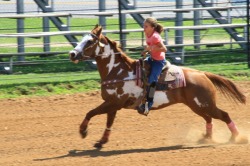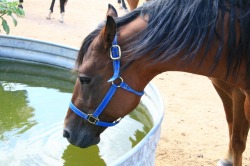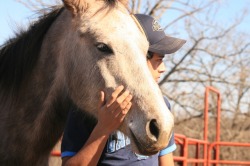What Would You Like From An Equine Job?

If you are anything like Robert Botine Cunningham-Graham, Scottish horseman, writer, and adventurer, then you know that there is no heaven without horses. If you eat, sleep, and breathe horses, then why not parlay all your time and effort into a career in the horse industry? Can you imagine a better way to spend your days?
Surveys done over the last several years show that there are 7 million horses in the United States today. And according to American Horse Council figures, the horse industry supports more than 1.4 million full-time jobs. There are a variety of careers in the horse industry, from hands-on jobs like large-animal veterinarian to jobs that support the industry, like feed and supplement distributor. There are jobs in breeding, showing, health, education, product manufacturing, research, recreation, and service industries to name just a few that come to mind. And one of these areas is most likely just right for you!
So, how do you find a job in the horse industry that is right for you? Well, before you start randomly sending out resumes to every horse-related employer you know of, you need to spend some time considering the type of career you want. In many cases, you'll have to come up with a plan that will lead you to that career. As wonderful as it is that you want to be a large animal veterinary technician, no one is going to hire you without the right credentials. In other words, like most worthwhile pursuits in life, you are going to have to spend a little time and effort to reach your goals.
So, are you ready? Answer these few simple questions and you'll be on your way to finding an equine career that is right for you:
• What do I want out of a horse career? Do you want daily contact with horses, or are you interested in working in a supporting field without daily contact? There are pros and cons to both. A supporting role may offer you a higher income, regular hours, more job stability, and better benefits, but a hands-on career gives you flexibility and the ability to work around your favorite animals every day. What is more important to you? Think very seriously about your own interests, abilities, and personality. It won't hurt to spend a few minutes writing down why you want to work with horses.
• What experience and education do I currently have? There is no teacher like experience, but is it more important than education in the horse industry? That depends on the job. For those seeking skilled hands-on positions like trainers, barn managers, and riding instructors, the more time you've spent around horses the better. Other choices, such as equine vet, writer, public relations expert, or lawyer require a college education and additional training.
• What experience and education am I willing to get to achieve my career goals? If you require experience and education to break into a career in the horse industry, you need to have a good understanding of how much time and money it is going to cost to reach your goals. Do you have the time and money to spare, and are you willing to do so?
• What income do I need? Most people work in the horse industry because their love of horses supercedes their love of money. Many hands-on jobs provide minimal pay and benefits just for the pleasure of being around horses. Salaries improve with higher-level hands on jobs, and support jobs often pay the most and offer the best benefits. Before you make a commitment to a career, know how much money you need to live. Then do some research to find out if your career can realistically support you.
• Where should I enter the industry in order to have a good chance of meeting my goal? Whatever career track you are pursuing, enter the industry in a job that you can handle with your present skills and experience. Getting in over your head may not only prevent you from advancing, it is dangerous! Once you've figured out your entry level, you can work your way up as you gain experience.
For More Interesting Equine Articles click the Url below
http://www.horsechitchat.com/equinearticles/
How To Get An Education In Equine Sciences

One of the many branches of animal sciences is equine science where the nutrition, reproduction, exercise philosophy, rehabilitation, behavior and welfare of the horse are taught to the interested student. Even the interaction between horse and rider is covered in equine science.
Once the student completes a course in equine science, the knowledge is used for improving the management, welfare and performance of both equine athlete and leisure horses.
There are many colleges and universities providing degree programs in equine science; and the reason students pursue this course are so that they can seek employment as trained professionals of the horse industry.
Equine science is a compilation of information from professionals:
You just have to visit the internet to find out which college or university in your vicinity teaches you equine science. Once you locate probable colleges, find out the terms of their courses, the fees that have to be paid for the course and if there are any other formalities to be met to join the course.
Once this is all done, you can approach the educational institution to pursue your course in equine science. There are many parts to equine science; where its introduction involves an overview of the horse industry. This involves teaching on the anatomy, genetics, physiology, nutrition and diseases of horses.
Equine science is basically taught in a non-conventional format where there is not one teacher or textbook but more of a compilation of information and resources from numerous professionals. With this format, students are provided information on both conventional and non-conventional forms of equine science as there is no single source with answers in equine science.
You can pursue advanced courses or special studies in equine science too:
Equine evaluation is a systematic approach in equine science with lessons on visual inspection and chances to speak in public towards verbal defence in your ideas and opinions. In addition to this, this class includes research areas of equine biomechanics and gait analysis. If you want to learn more about gait analysis and equine biomechanics, you have to pursue a course in Advanced Equine Evaluation.
You get to actually handle and train horses in equine training when you get to study the science of behavior of horses. Once the horses are trained in this class, the horses will be ready to be offered at public auction.
An advanced course in equine science is Horse Production and Management where you have to pass courses in various courses like Animal Breeding and Genetics, Animal Physiology and Anatomy and Animal Nutrition and Animal Reproductive Physiology to gain admission to the course.
If interested, you can also take up Livestock Merchandising to organize and conduct a livestock auction. Animals in this class are sold to the public, while the generated proceeds are used for supporting equine and beef cattle programs.
In addition to all this, you can also undertake undergraduate research projects, independent studies and special studies on horse related topics of interest and explore the topic extensively. This type of education will prepare you for the equine job of your dreams!
Article by Equine-Jobs.com. For more information on finding an equine job, equine employment, or a whole new equine career, please see our websites at: http://www.equine-jobs.com, and http://www.squidoo.com/equinejobs
Sign Up For Our Free Report, Special Members Link, And 10 Free Digital Equine Puzzles Using The Form Below!
Information On Equine Therapy - And Why Working With Horses Is Good For You

The exact origin of horses is not known, though they are thought to have originated near the Thaelon Forest and from there spread out, either due to land bridges to other continents, or else being taken to other areas by man.
It is believed that horses were one of the first domesticated animals. They are most definitely one of the most useful of animals—transportation, load bearing, and even has martial uses. There are many species of horse found throughout the world, and they have varying characteristics/personality.
Horses perceive us in a pure way, undistracted by words, appearance or social standing. The beauty of horse as a ‘best friend’ is that you can’t fool them. Horses teach us to be in the moment. Since horses have no distractions they are tuned into every nuance a person makes, and give immediate feedback.
A horse is a non-judgmental friend, but often a rider must adapt or change his or her own behavior in order for the horse to respond. Like us, horses have different personalities, so what works with one horse won’t work with another—not unlike humans. Horses also require people to engage and persevere in challenging physical and mental work, a characteristic which once learned, becomes in handy in dealing with life’s many intimidating and challenging situations.
What about horses gives them a place as ‘man’s best friend?’ They’re big and powerful, which means riders and groomers need to overcome fear and develop confidence. Horses sense the level of confidence of a person. Having ridden horses from toddler age, I can attest to their innate ability to see right through a person immediately.
According to Edward Cumella, PhD, director of research at the Remuda Ranch treatment center in Wickenburg, Arizona, horses, readily see our fear, feelings of inadequacy, sorrow and anger. Cumella posits, “Horses’ sensitivity to nonverbal communication assists patients in developing greater awareness of their own emotions and nonverbal cues, as well as the role of nonverbal communication in relationships.”
Treatment centers from the East to West coast offer equine-assisted therapy to help people with everything from drug addiction to cancer recovery. Horses and humans have always enjoyed a special relationship. Ancient Greeks first documented therapeutic use of riding horses in 600 B.C. In 1875, a French physician first supported a study of the value of riding-as-therapy through using it to treat neurological and psychological disorders.
More than 10 studies in the past 20 years show that animal-assisted therapy—equine therapy is the most common—is effective in treating anxiety, autism, dementia, depression and attention deficit disorder, eating disorders and other emotional dysfunctions.
Shangri-La Therapeutic Academy of Riding in Tennessee, horseback riders with spina bifida experience the exhilarating rolling movement of walking for the first time via the four legs of a horse rather than their own two.
I spent nine months interning at Green Chimneys, Brewster, New York, horses from Iceland help emotionally troubled kids learn how to create independence and self confidence. Having grown up with horses, it was awe inspiring to see the children move from fear of being near a horse to wanting to have the horse sleep with them.
Remuda Ranch helps children with eating disorders gain greater self-acceptance and confidence with themselves. At Medicine Horse in Colorado, at-risk teen girls coping with mood or attention disorders become more comfortable with themselves and develop supportive friendships based on honesty and respect. Disrespect a horse and you can expect repercussions—biting, head butt, bucked off, their refusal to cooperate or kicked. Rancho Bosque at Sunstone Cancer Center in Tucson, Arizona, clients learn that they have the power to be in the moment and control how they deal with a potentially dangerous and human vs animal situation.
That is the alchemy of horse-assisted therapy. Put a horse and a human in breathing distance and something inexplicable occurs—a communication that only they understand. Diane Kennedy, a psychotherapist, registered riding instructor and founder of the 10-year-old program Medicine Horse in Boulder, Colorado, believes, “Horses mirror our emotions, thoughts and feelings.” Observing how horses reaction—how we interpret their behavior—can help therapists untangle the murky issues of their clients. The horse becomes a transitional object,” she explains, “a creature with whom it is safe to be intimate and who returns the same love given. People get familiar with what that kind of solid connection feels like and can take that knowledge into everyday life.
“Horses are uniquely sensitive, providing a nonverbal vehicle for people to access their emotions, which can accelerate the pace of healing,” states, Dr. Allen Hamilton of the Sunstone Cancer Center at Rancho Bosque in Tucson, Arizona. He models his equine-assisted therapy on the Native American teaching that horses are a gift from the Creator and act as guides and spiritual brothers to the Sioux and Apache. Native Americans believe animal energy has medicine for humans and that each person has an animal as a source of guidance.
“Horse is a physical power and unearthly power. In shamanic practices throughout the world, Horse, enables shamans to fly through the air and reach heaven. Humanity made a great leap forward when Horse was domesticated, a discovery akin to that of fire. Horse was the first animal medicine of civilization. Today we measure the capacity of engines with the term ‘horsepower,’ a reminder of the days when Horse was an honored and highly-prized partner with humanity [on a daily basis].” Jamie Sams and David Carson, Medicine Cards.
Medicine Horse’s participation in the national Hope Foal project, which rescues at-risk foals or mares kept confined and pregnant to produce estrogen for the hormone replacement drug Premarin, simultaneously rescues at-risk teenage girls coping with mood or attention disorders that can have severe consequences. Under the guidance of a trained facilitator, the horses become the girls’ nonjudgmental ally, helping them figure out how to set boundaries, relate to others and build trust without getting hurt in the process.
Dorothy M. Neddermeyer, PhD, author, motivational speaker, spirational leader and Mind, Body, Spirit healer. Dr. Neddermeyer empowers people to view life's challenges as an opportunity for Personal/Professional Growth and Spiritual Awakening. http://www.drdorothy.net
Article Source: http://EzineArticles.com/?expert=Dorothy_M._Neddermeyer,_PhD
Sign Up For Our Free Report, Special Members Link, And 10 Free Digital Equine Puzzles Using The Form Below!
Wishing You The Best Of Luck On Your Equine Job Search!

